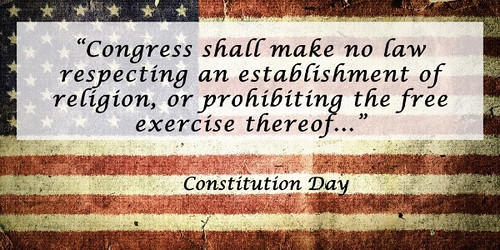General Discussion
Related: Editorials & Other Articles, Issue Forums, Alliance Forums, Region ForumsEstablishment Clause

231 years ago today, the Constitution of the United States was officially adopted. This established the framework for our democracy and ensured that the separation of church and state would forever be enshrined in the character of our country. Our founders were unequivocal when they wrote: “Congress shall make no law respecting an establishment of religion...” This bold and revolutionary line is known as the “Establishment Clause” and it solidified the United States as a secular country, forever setting our nation apart.
Unfortunately, more than two hundred years later, the President of the United States has nominated a judge for the Supreme Court who rejects this key constitutional principle. After examining his record, as well as the statements he made during his confirmation hearings, the facts now point to the inescapable conclusion that Judge Brett Kavanaugh is an Establishment Clause Denialist.
Like climate change denialists, Kavanaugh refuses to accept the mainstream scholarly opinion about the Establishment Clause and its meaning. And, like many climate change denialists, Kavanaugh is part of a well-funded and well-coordinated effort to tear down the wall of separation between church and state.
Here are just a few examples Judge Kavanaugh’s hostility towards the Establishment Clause:
Just last year, Judge Kavanaugh approvingly cited a quote by his judicial hero, Justice Rehnquist, who argued that the wall of separation metaphor was “based on bad history” and “useless as a guide to judging.”
In an email released from 2002, Kavanaugh states that he does not believe the Establishment Clause prohibits the government from directly funding religious institutions.
In response to a question from Senator Cornyn, Kavanaugh gave favorable mention to the Supreme Court decision in the Good News Club v. Milford Central School case. The Good News decision required schools to open their doors to evangelical clubs, giving students the unavoidable impression that their school endorses one religion above all others.
In response to questions from Senators Cornyn and Cruz, Kavanaugh referenced his amicus brief in the Supreme Court case Santa Fe Independent School District v. Doe. Kavanaugh argued, unsuccessfully, that students should be able to broadcast prayers over a public school’s PA system during school-sponsored events. Throughout his confirmation hearing, Kavanaugh, Cruz, and Cornyn recalled the case and expressed their mutual dismay over the Court’s (correct) decision.
Kavanaugh’s denial of the Establishment Clause will have real consequences if he is seated on the Supreme Court. His rulings will open the door for religious institutions to receive public dollars, striking down the defining quality of our secular government.
His decisions will erode and distort decades of clear legal precedence relating to the Establishment Clause. And his mere presence on the Court may embolden theocratic lawmakers, at the state and federal level, to push the boundaries and introduce even more radical legislation that privileges their religion.
231 years after our founders began the experiment of American democracy, we are fighting to save it. The history of our country is an imperfect march towards progress, expanding the rights of the Constitution to more people in an effort to achieve liberty and justice for all. But now, the religious right is trying to undo these hard won victories by appointing a judge to America’s highest court who rejects America’s founding principles.
We’re working on Capitol Hill to educate lawmakers about Kavanaugh's record and connect constituents to their Senators. But we can’t do it without your help. On Constitution Day, help support our work defending the wall that separates church and state — and safeguards our civil rights. Brett Kavanaugh may not believe in it but we do.
mahatmakanejeeves
(57,378 posts)That would have to wait until the first ten amendments had been added.
Happy Birthday, Bill of Rights, ratified on this day in 1791

On this day {December 15} in 1791, the Bill of Rights became law when it was ratified by the Virginia General Assembly.
yortsed snacilbuper
(7,939 posts)What is the exact date the Constitution was officially adopted?
The drafting of the Constitution of the United States began on May 25, 1787, when the Constitutional Convention met for the first time with a quorum at the Pennsylvania State House (now Independence Hall) in Philadelphia, Pennsylvania to revise the Articles of Confederation, and ended on September 17, 1787.
the first 10 amendments to the United States Constitution. Called the "Bill of Rights", these amendments were ratified on December 15, 1791.
mahatmakanejeeves
(57,378 posts)Ratification would drag on through 1788:
Timeline of drafting and ratification of the United States Constitution
malaise
(268,885 posts)Now